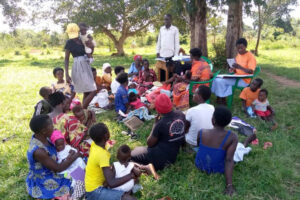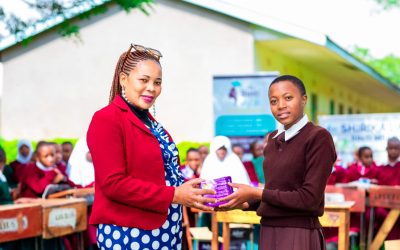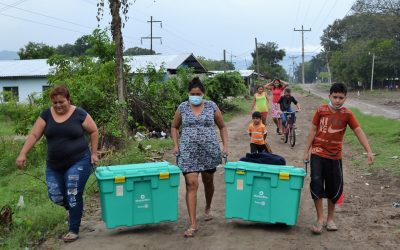The Rotary Club of Southport Links has been working in tandem with the Rotary Club of Jinja in Uganda and the Australian Rotary Action Group, Food Plant Solutions.
The Food Plant Solutions Group was established in 2007, through members of the Rotary Club of Devonport North in Tasmania and based on the work of agricultural scientist, Bruce French.
The objective of Food Plant Solutions (FPS) is to combat hunger and malnutrition, and ensure food security by empowering people through education so they can make informed choices about what to plant, eat and grow to achieve a diverse, sustainable, nutritious diet.


A Food Plant Solutions Trainer with members of the local community.
Working with existing aid providers in more than 50 countries, FPS have produced National Publication Packages.
One main booklet ‘Potentially Important Food Plants of Uganda’ describes each of the suggested plants, outlining the nutritional levels provided. These have been published in English, as well as on the FPS website in Lhukonzo and Luganda languages.
These translations have provided access to rural co-operatives, women’s groups and subsistence farmers who often don’t speak or read in English but do so in their own tribal language.
The link between Jinja and Southport Links Rotary Club was formed in 2020 with the then Club President Faustine Victor Ngarambe and David Taylor following a project supporting refurbishments at the Baltiwegomba School for Visually Impaired, a local home supported by the Jinja Club.
A further programme was selected, tying in with Rotarian Ngarambe’s role running the St Francis Health Care Services.
One area of support is Aids’ orphans and their grandmother carers. These grandmothers have formed women’s groups covering more than 500 families.
The objective of Food Plant Solutions is to combat hunger and malnutrition, and ensure food security by empowering people through education so they can make informed choices about what to plant, eat and grow to achieve a diverse, sustainable, nutritious diet.”
Amongst the support provided is guidance on agricultural techniques on land adjoining the Health Care Centre. The intention of this training is to empower the women with skills to grow food, providing a nutritious diet to their charges and families.
The guidance provided by the Food Plant Solutions’ ‘Uganda programme’ was given to women’s groups during their training, supported with the picture guides and online translation.
Some 150 sets of the picture guides were printed in Kampala for Southport Links Rotary Club. These booklets were printed in English and were used by the trainers instructing the groups.










